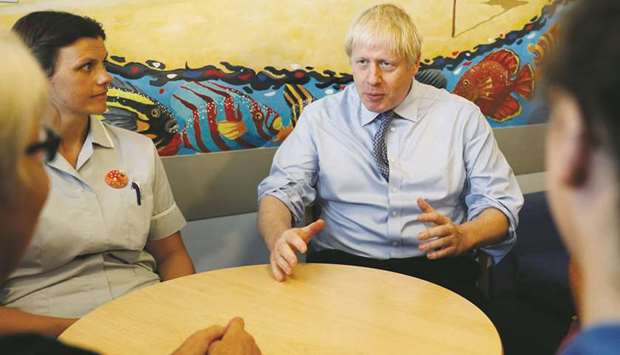Britain said yesterday that it would end European Union freedom of movement rules immediately after it leaves the bloc on October 31, but Prime Minister Boris Johnson said the country would not be hostile to immigration.
Under Johnson’s predecessor, Theresa May, the government had said only that if Britain left the EU without a transition deal it would aim to end free movement “as soon as possible”.
Johnson, who took office last month, has promised to take Britain out of the EU with or without a deal on October 31.
“Freedom of movement as it currently stands will end on 31 October when the UK leaves the EU, and after Brexit the government will introduce a new, fairer immigration system that prioritises skills and what people can contribute to the UK, rather than where they come from,” a spokesman for Britain’s interior ministry, the Home Office, said in a statement.
“EU citizens and their families still have until at least December 2020 to apply to the EU Settlement Scheme and 1mn people have already been granted status.”
Around 3.5mn EU citizens already live in Britain, and it is unclear what will happen to those who do not register for the scheme by the end of October.
Johnson’s spokeswoman said further details on the changes to freedom of movement are being worked on and would be set out shortly, but would include tougher criminality checks.
“What we are going to do is leave the EU, and that means that legally all those powers revert to the UK ... that does not mean that we are going to stop anybody coming into this country, it doesn’t mean that we are going to become remotely hostile to immigration or to immigrants,” Johnson told BBC Radio Cornwall.
“What it does mean is that immigration into the UK will be democratically-controlled and we will be producing an Australian-style points-based system to do it.”
Critics representing EU citizens claim he is trying to evade parliamentary scrutiny of his changed stance towards new arrivals after Brexit – and fear those already in Britain could get mistakenly caught out.
“Ending freedom of movement abruptly on Oct 31st will lead to mass discrimination against potentially over 2mn EU citizens,” the3million lobby group said on Twitter, calling the move “reckless”.
The Home Office said there would be no change to planned rules for EU citizens and their families already living in Britain by the end of October, who would still have until at least the end of December 2020 to apply to Britain’s EU Settlement Scheme.
No one eligible for settled status would be barred from re-entering Britain when free movement ends, the Home Office said.
Meanwhile, Johnson and his Irish counterpart Leo Varadkar spoke by phone for almost an hour yesterday, and agreed to meet in Dublin in early September, the Irish and British governments said.
Should Britain leave the European Union on October 31 without a deal, this risks the return of a hard border between the British province of Northern Ireland and EU member Ireland.
Since taking office last month, Johnson has said he wants to agree a deal with the EU but only if it drops the so-called Irish backstop, an insurance policy in the deal negotiated by his predecessor, Theresa May, aimed at avoiding a hard border between Ireland and the British province of Northern Ireland.
According to identical statements issued by the two governments following the call yesterday, both men stuck to their existing positions.
Johnson said the current Brexit deal would not be approved by parliament and the backstop needed to be removed and replaced with an alternative solution, while Varadkar reiterated the EU’s position that the deal cannot be reopened and emphasised that there must be a legal guarantee to prevent a hard border.
“They agreed that their teams would maintain close contact over the coming weeks, while recognising that negotiations take place between the UK and the EU27 Task Force. They also agreed to meet in Dublin in early September,” the statements said.
Johnson also made clear that the Common Travel Area, which allows British and Irish citizens to move freely between the two countries and enjoy additional rights, would not be impacted by Britain ending EU freedom of movement rules after Brexit, the governments added.

Johnson with health professionals during his visit to the Royal Cornwall Hospital in Truro, Britain.
